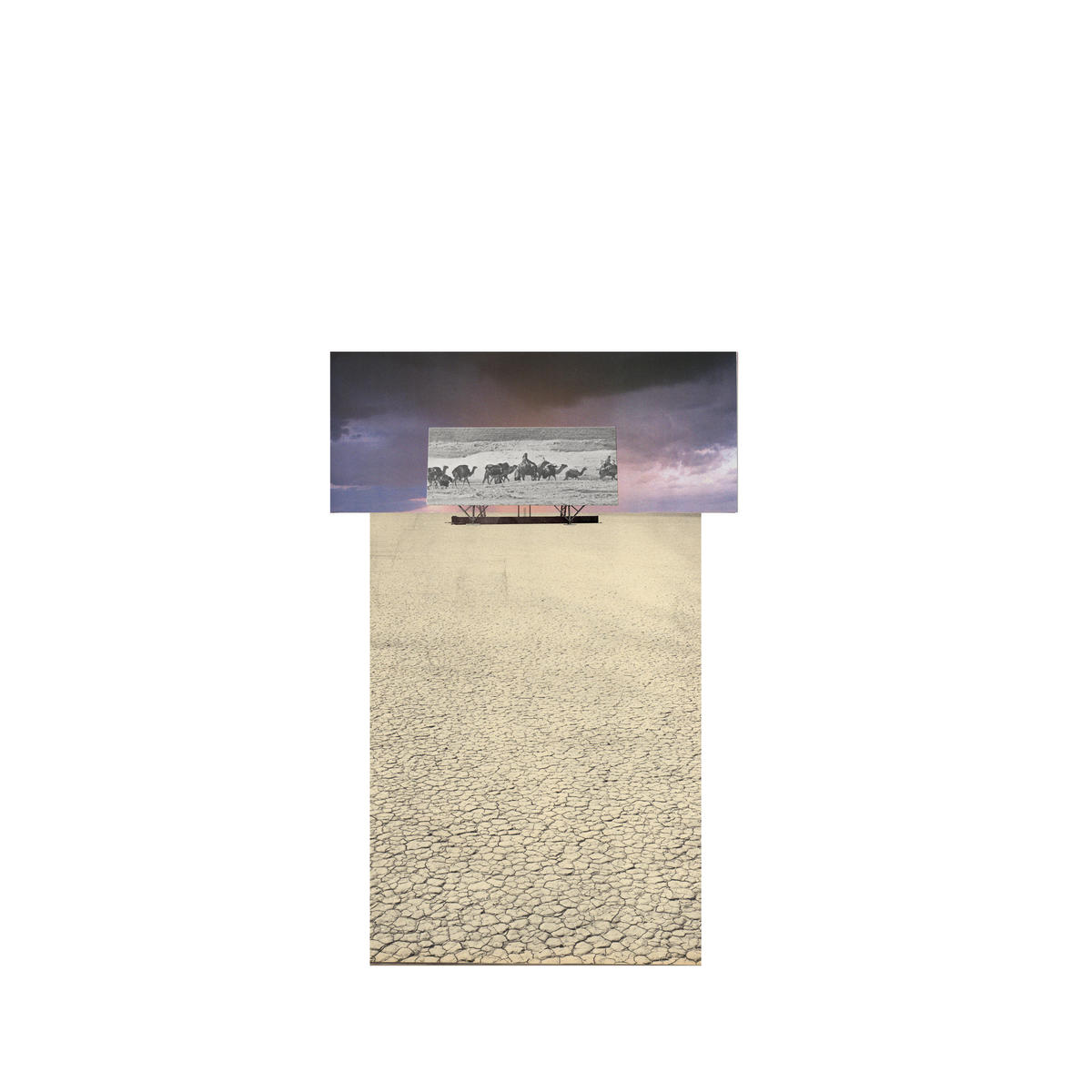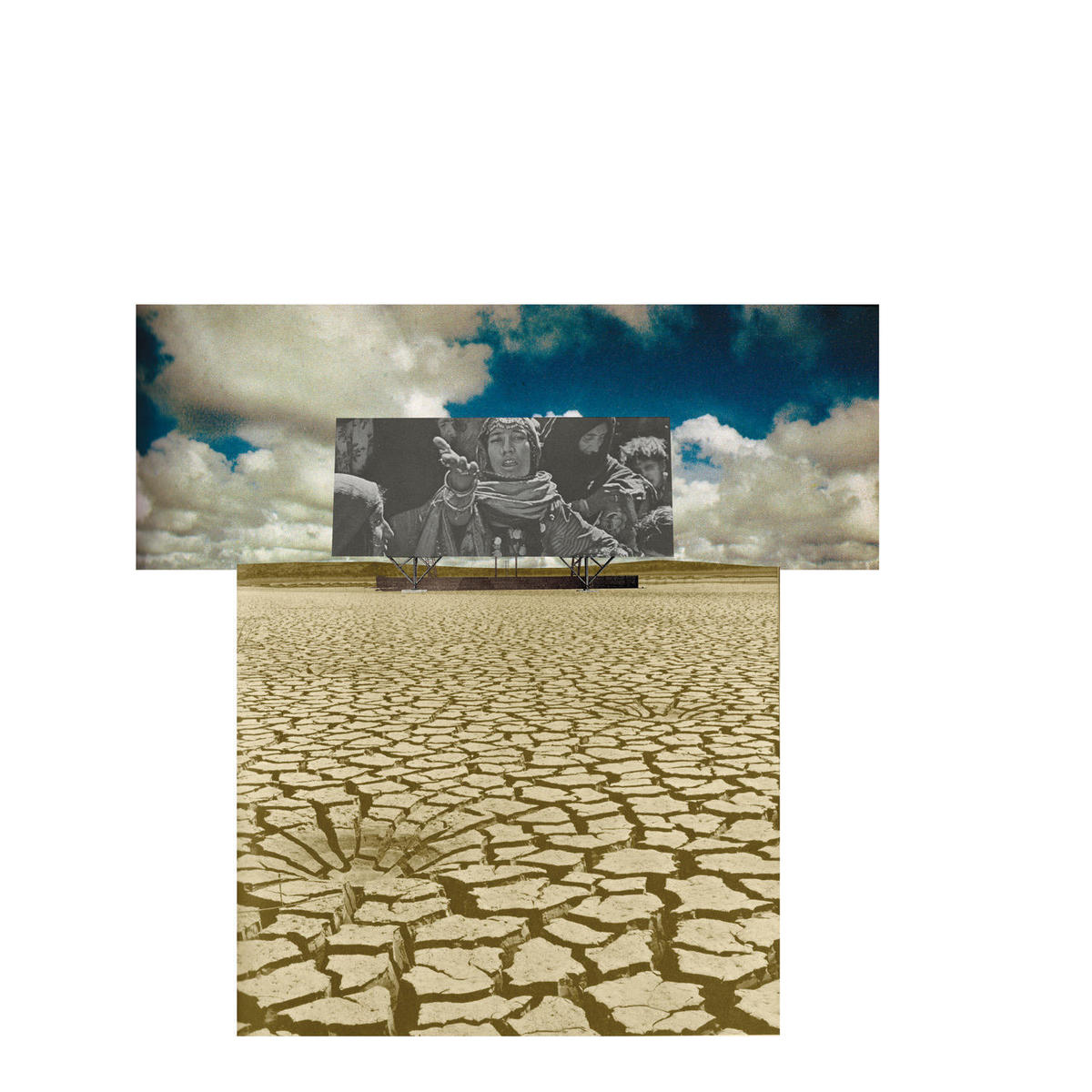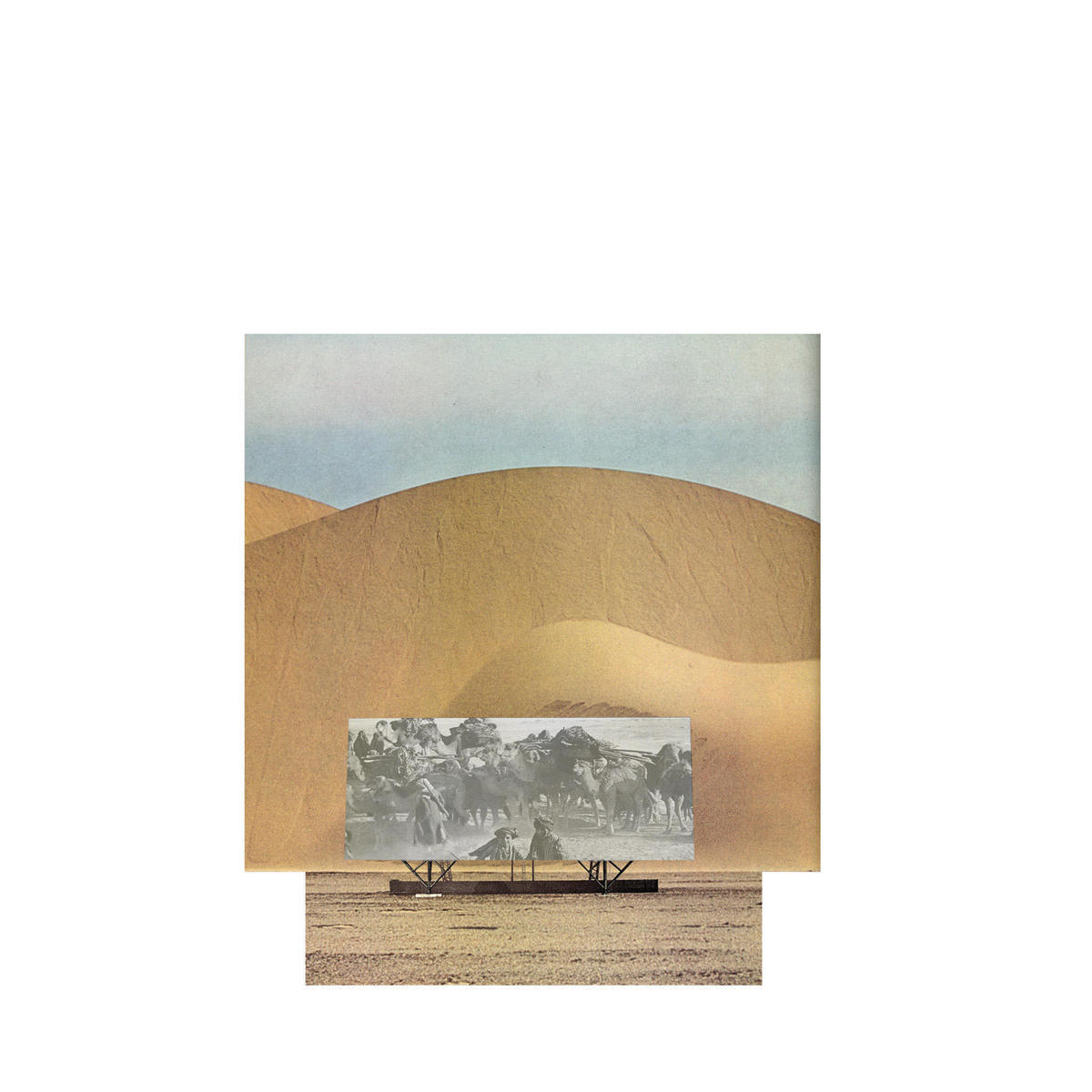
…[to] all the Youth of the Al-Murrah who face probably the greatest changes of any people in the world.
— Donald Powell Cole, dedication to Nomads of the Nomads, 1975
In a darkened room of the Qatari National Museum, three screens play silent films of Bedouin life. The images are washed out and damaged from thirty years of continuous play. On one screen, my grandfather stands with a group of men squinting into the camera, raptors flapping. The men are falconers, and their birds cling blindly to their forearms. The corners of the images have collected a grainy residue; sometimes the picture skips. On another screen, an elderly woman, face veiled in black, two long braids swaying down her back, waddles across the frame behind a small herd of goats. This room is an anomaly in a museum dedicated to pearls and oil and dioramas. Amid the sample oil drills, limestone cross sections, and restored pearling dhows, it is strange to see the disintegrating footage of the Al-Murrah proudly bearing their swords and rifles, posing as though for a still photograph while the camera pans up and down their straight-shouldered frames. No one visits this room. No one seems to visit the museum at all. The films play on repeat, wearing out their images.
The museum was an ambitious project conceived and completed by Sheikh Khalifa bin Hamad Al-Thani in 1976. It was built to represent 200,000 years of human history and fifteen centuries of Muslim values in the Persian Gulf. The structure of this history-palace is a refurbished complex of royal residences. The castle is uncharacteristic of modern Gulf architecture, which reflexively replaces decaying buildings with bigger, shinier buildings; Khalifa was a traditional leader, concerned with the welfare of Qatar’s values against the dizzying g-force of sudden wealth and foreign infiltration. He seemed to be grasping for an authentic Qatari experience that could resist the onslaught of the oil conglomerates and the largest Dairy Queen in the world. So he did two things to ensure that Qatar would not lose its cultural heritage. He built an ambitious museum of the state and sea, and he strengthened his military by drafting the symbolic old guard of Arab honor, the Al-Murrah Bedouin: my family.
It is weighty, this name. I come to it the old-fashioned way, by my father, a modernist. He left the Empty Quarter to go to college in Montana. The Saudi government paid for him to learn business, while he secretly made plans to become a long-haul trucker. He was one of the first of our clan to go to America, and he was the first to marry a white woman. The first to marry outside the family, even, though there would be others. It continues to be scandalous.
We are a fierce and honorable people, we Al-Murrah, at odds with the world and the desert and the people of the towns. I know this to be true, because I read a whole book about it. About us: Nomads of the Nomads: The Al-Murrah Bedouin of the Empty Quarter. Though by the time I found the book, browsing the picked-over offerings in the library at the American University in Cairo, many of us, including my siblings and our extended family, were living in Qatar. By the time I read the book, in fact, many of our men were in jail in Qatar. Or, like my father, in exile.
But I am getting ahead of myself.

We acquired our reputation in the desert. The most deserted desert in the world, a vast sea rippled with ridges and waves and islands of sand. The Rub el Khali, we call it — in English, the Empty Quarter. Desert people do desert things, like herd goats and ride camelback and plunder the occasional village for essentials, while finding ways to work around the sweltering heat and aridity and the delirious hallucinations that ensue. At some point, we stopped pillaging the towns and started offering “protection,” although there were always broad-backed men with black camels ready to take up arms for glory or profit. In this way, the Al-Murrah were crucial to the success of Prince Abdul Aziz al Saud, a ruthless raider whose exploits along the Gulf’s coast emboldened him to create the Saudi kingdom as we know it today. In this way, too, the Al-Murrah and other Bedouins became the core of the Saudi Arabian National Guard. We would play this role for decades. For our fine work, we were rewarded with Land Rovers and houses and passports. Perhaps these were “the greatest changes” faced by any people in the world? In any case, at the age of twelve, my father went to town for the first time to buy his first pair of shoes, and at the age of twenty, he was sent with a cousin to study in America on scholarship.
He returned, but not to Saudi Arabia. Thousands of us — and there were only thousands of us to begin with — had moved to the country that likes to think of itself as “the finger of Arabism in the Gulf.” Newly minted Qatar (est. 1971) was fast becoming one of the wealthiest plots of sand on earth, and Sheikh Khalifa naturally moved to consolidate his regime and demonstrate to neighboring emirates that tiny Qatar would nonetheless possess an outsize and formidable military. More than half of the men in my immediate family found work in this way, where the sheikh’s generosity (and racism) helped them get promoted ahead of the Pakistani and Yemeni fighters who made up the bulk of the Qatari army. It may have helped that we were coreligionists, as well: like the sheikh, the Al-Murrah were fervently Wahabi. Various Al-Murrah tribesmen became military colonels or police captains. Great Uncle Hadi, my father’s uncle, became a pilot. We had influence, free healthcare, a small share of the country’s wealth, and a big share of its pride. For two glorious decades, all was well between the Al-Thani royals and their Al-Murrah loyalists.
In June of 1995, Sheikh Khalifa flew to England on his private jet for a shopping spree. While cruising the streets of London, Sheikh Khalifa was dethroned by his son Hamad. The newspapers hailed the “bloodless coup” as a “civilized overthrow.” It was clear to many that the younger, more corpulent sheikh, who had been educated abroad, had become frustrated by the slow pace of change in Qatar. Inspired — or, perhaps, humiliated — by the United Arab Emirates, which was expanding in every direction, from architecture to tourism to political clout, Hamad wanted more for Qatar than concrete castles, pearl diving, and isolationism. He saw Doha as the next Dubai: a haven for “forward-thinking” Arabs from across the region and America’s right-hand peninsula in the Gulf. He saw a new world of glass skyscrapers, sleek minarets, and lots and lots of high-end shopping malls. His father was not part of the plan.
And nor, it must be said, were the Al-Murrah. It is difficult to say what would have become of my family in the Doha of the Future, had we embraced it. Although what remained of Bedouin ways would likely have been further eroded by the gale winds of progress unleashed by the new sheikh, in retrospect things could not have gone much worse.
The “bloodless coup” was not without its critics. Some argued that the younger sheikh had behaved ungratefully, a traitor to the ancient codes of paternal respect and decorum. Perhaps others were offended by the bloodlessness. I cannot say; I was twelve years old and living in Washington State at the time, and I am female, so what I know about the momentous events of these days comes two or three times removed, from overheard conversations between my grandmother and my aunts and the gossip of the prisoners’ children I’ve since met. What I do know is that for some of the men of the Al-Murrah, the young sheikh’s coup was an affront to honor and the harbinger of a future they wanted nothing to do with. And far be it from the Al-Murrah to allow their legacy to go down without a fight.
It ended badly. A dozen army officials imagined a glorious and bloody overthrow that would change the fortunes and legacy of the Al-Murrah and bring glory back to the people. Passing whispers in the mosque, covert meetings in the Majlis, secret handshakes, and military bravado — maybe too much bravado. One or two or half a dozen informers passed hints of unrest on to the new sheikh’s men. Before it really began, the counter-coup was over.
It was never clear how many Al-Murrah men were involved. Several of them are still in jail twelve years later; some of them, close members of my family, sit on death row to this day. There have been allegations of torture. In any case, it was not long before the authorities had acquired a list of names that comprised much of the male Bedouin population. Over the next year hundreds of men were rounded up, while thousands more were exiled or blacklisted.

By the time I came back from the States in 1999, the only Al-Murrah left free in Qatar seemed to be elderly men and women, although most had had their citizenship revoked or suspended some years before. One great uncle had fled across the border to El Hassa in Saudi dressed in his wife’s Burqa. Dressing as a woman was a stroke of genius for the old timer. But it was also emasculating, and he is still spoken of within the family as a joke, not as the daring practical thinker he proved himself to be.
The nomads of the nomads have been tamed. Under Sheikh Hamad’s direction, Doha can now boast the WTO Conference, the largest American military base outside the US, the 15th Asian Games, Al Jazeera, a female parliamentarian, and the biggest concrete shopping cart in the world. And he has been kind if not magnanimous in the later years of his victory; today most of us are once again Qatari citizens. Grouped together in government projects just west of the wretched Doha International Zoo, the Al-Murrah spend their days looking toward the Saudi border, dreaming of the past.
Sometimes on a Friday afternoon after prayer, my great uncle takes the younger children across the highway to break zoo regulations and feed the sad menagerie. He laughs at the way the boys and girls dote on the ostriches and insists that they haven’t lived until they’ve hunted a wild ostrich of their own. Like most kids these days, they ignore the old man, pausing barely a second to look the ostrich in the eye while feeding it sugar cookies. The unsuspecting heirs to our great loss trot off to chuck potato chips at the chimpanzees until sunset, leaving Great Uncle to the contemplation of the molting ostrich in her chicken-wire cage, mulling the greatest change of all: irrelevance.